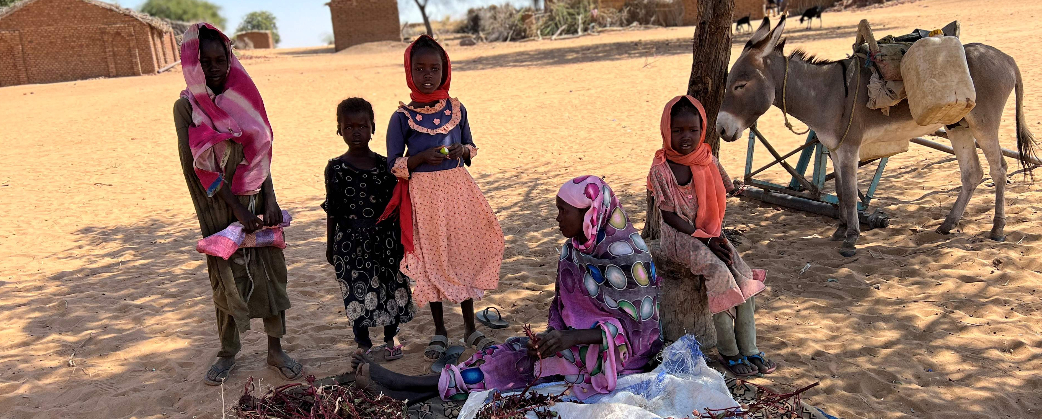November 28, 2025 | 02:38 GMT +7
November 28, 2025 | 02:38 GMT +7
Hotline: 0913.378.918
November 28, 2025 | 02:38 GMT +7
Hotline: 0913.378.918

A beneficiary of a FAO seed distribution activity in 2022 in Sudan is sitting outside her house with children in the village of Abu-Delaik in El-Fashir, North Darfur.
The current crisis in Sudan has worsened an already dire food insecurity situation, with hunger expected to increase substantially across the country as it heads into the typical lean season period from June to September.
To scale up its response, the Food and Agriculture Organization of the United Nations (FAO) urgently requires $95.4 million to reach 15 million people with multiple life-saving interventions including providing farmers with seeds and farming equipment and protecting and restocking pastoralists’ livestock herds.
FAO’s immediate plan is to assist over one million vulnerable farmers and their families (totalling five million people) between now and the end of July with cereal seeds (sorghum, millet) and okra seeds for planting in June to July 2023 in the country’s 14 states. Additionally, from July until the end of the year, FAO aims to target 1.3 million pastoralists with livestock services and inputs to strengthen the food security and nutrition of 6.5 million people.
The Organization’s emergency seed distribution, totalling 9 600 tonnes to the most vulnerable farming households in June and July, will allow vulnerable farmers to plant and produce enough food (up to 3 million tonnes of cereals) in November–December 2023 to cover the cereal requirements of between 13 and 19 million people.
“We are doing everything we can to utilize the relatively calm conditions in rural areas and the current planting season to rapidly increase local food production and availability, save lives and avoid more people sliding into acute food insecurity,” said Adam Yao, FAO Representative a.i in Sudan.
FAO remains operational in the country’s 14 state offices. State authorities and local community leaders, as well as 40 national implementing partners continue to confirm their readiness to resume operations and support FAO emergency seed distribution.
Food security situation remains dire
In 2022, the number of people at crisis or worse levels (Integrated Food Security Phase Classification [IPC] Phase 3+) during the lean season was estimated at 11.7 million. Given the likely ripple effects of displacement, trade disruptions, and surges in food and fuel prices, the number of highly food insecure people in the country during this year’s lean season could be above last year’s figure.
Moreover, according to the latest IPC analysis, in the post-harvest period between October 2022 to February 2023, nearly eight million people were estimated to be acutely food insecure – a figure already 30 percent higher compared with the same period in the previous year.
“The current crisis has hit at a critical time for the millions of people reliant on food and agriculture,” said Rein Paulsen, Director of FAO's Office of Emergencies and Resilience. “We have a short but crucial window now to support local food production considering direct threats to other forms of life-saving assistance and difficulties in ensuring the rapid and safe passage of humanitarian goods across international borders. Boosting local food production and safeguarding livelihoods will not only reduce the food insecurity and human suffering in the country, but eventually lower the likely expanding humanitarian caseload in the coming months.”
(FAO.org)

(VAN) A new study reveals how the simultaneous effects of ocean acidification, salinity and loss of oxygen are making the world more fragile.

(VAN) Hopes are growing that the creation of the first 3D turkey gut model could be a turning point in the battle against the virulent blackhead disease.

(VAN) Tyson, America’s biggest meat supplier, plans to shutter one of its largest beef processing plants as the industry continues to struggle with low cattle supplies and political pressure from Washington.

(VAN) New FAO study shows how digital solutions are empowering farmers and fishers to prevent losses and build resilient agrifood systems.

(VAN) Brazil's COP30 presidency pushed through a compromise climate deal on Saturday that would boost finance for poor nations coping with global warming but that omitted any mention of the fossil fuels driving it.

(VAN) Poultry farmers in the UK have been warned that they could face one of the worst winters yet for bird flu.

(VAN) Prices of main-crop paddy have risen sharply, with jasmine rice hitting 16,100 baht per tonne — the highest level in years.